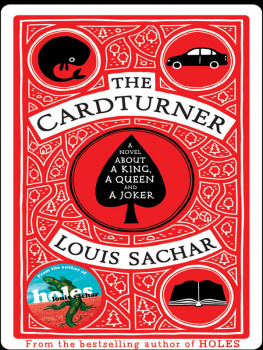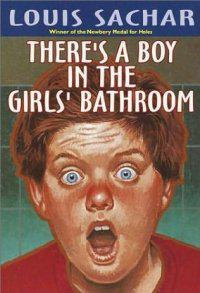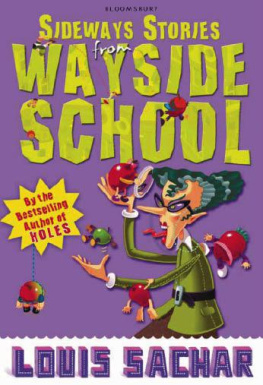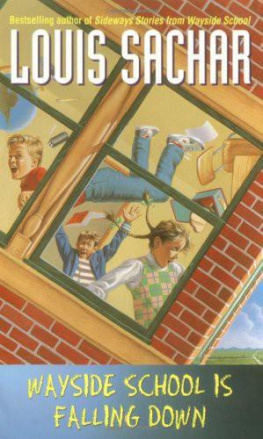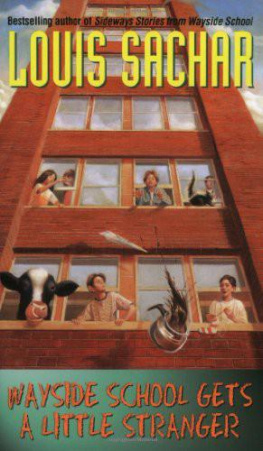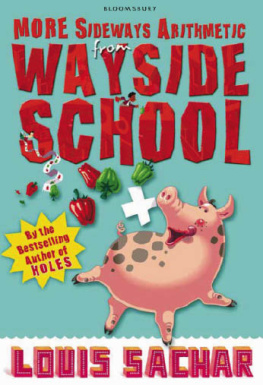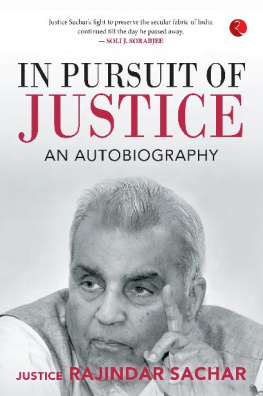Louis Sachar - The Cardturner
Here you can read online Louis Sachar - The Cardturner full text of the book (entire story) in english for free. Download pdf and epub, get meaning, cover and reviews about this ebook. year: 2010, publisher: Delacorte Books for Young Readers, genre: Detective and thriller. Description of the work, (preface) as well as reviews are available. Best literature library LitArk.com created for fans of good reading and offers a wide selection of genres:
Romance novel
Science fiction
Adventure
Detective
Science
History
Home and family
Prose
Art
Politics
Computer
Non-fiction
Religion
Business
Children
Humor
Choose a favorite category and find really read worthwhile books. Enjoy immersion in the world of imagination, feel the emotions of the characters or learn something new for yourself, make an fascinating discovery.
- Book:The Cardturner
- Author:
- Publisher:Delacorte Books for Young Readers
- Genre:
- Year:2010
- Rating:5 / 5
- Favourites:Add to favourites
- Your mark:
- 100
- 1
- 2
- 3
- 4
- 5
The Cardturner: summary, description and annotation
We offer to read an annotation, description, summary or preface (depends on what the author of the book "The Cardturner" wrote himself). If you haven't found the necessary information about the book — write in the comments, we will try to find it.
The Cardturner — read online for free the complete book (whole text) full work
Below is the text of the book, divided by pages. System saving the place of the last page read, allows you to conveniently read the book "The Cardturner" online for free, without having to search again every time where you left off. Put a bookmark, and you can go to the page where you finished reading at any time.
Font size:
Interval:
Bookmark:
THE
CARDTURNER

ALSO BY Louis Sachar
Holes
Small Steps
Stanley Yelnats' Survival Guide to Camp Green Lake
Dogs Don't Tell Jokes
The Boy Who Lost His Face
There's a Boy in the Girls' Bathroom

Bloomsbury Publishing, London, Berlin and New York
First published in Great Britain in June 2010 by Bloomsbury Publishing Plc
36 Soho Square, London, W1D 3QY
First published in the USA in May 2010 by Delacorte Press, an imprint of Random House Childrens Books, a division of Random House Inc., New York
This electronic edition published in June 2010 by Bloomsbury Publishing Plc
Text copyright Louis Sachar 2010
The moral rights of the author have been asserted
The publishers are grateful to the following for permission to reproduce copyright material:
Lines from Cannery Row by John Steinbeck Penguin Modern Classics New Edition, ed. Susan Shillingford, published in Great Britain in 2000 by Penguin Books, page 107 lines 7-11, copyright 1945 by John Steinbeck. Reproduced by permission of Penguin Books Ltd.
Bye Bye Blackbird Words by Mort Dixon/Music by Ray Henderson 1926 (Renewed) Ray Henderson Music Corp., Old Clover Leaf Music, Redwood Music Ltd. All Rights Reserved International Copyright Secured Lyric reproduction by kind permission of Redwood Music Ltd.
Bye Bye Blackbird Words and music by Ray Henderson and Mort Dixon 1926, reproduced by permission of EMI Music Publishing Ltd, London W8 5SW
Bye Bye Blackbird Words and music by Ray Henderson and Mort Dixon 1926, reproduced by permission of Warner/Chappell Music Ltd, London W8 4EP
All rights reserved
You may not copy, distribute, transmit, reproduce or otherwise make available this publication (or any part of it) in any form, or by any means (including without limitation electronic, digital, optical, mechanical, photocopying, printing, recording or otherwise), without the prior written permission of the publisher. Any person who does any unauthorised act in relation to this publication may be liable to criminal prosecution and civil claims for damages
A CIP catalogue record of this book is available from the British Library
ISBN 978 1 4088 1243 3
www.bloomsbury.com
www.louissachar.co.uk
Visit www.bloomsbury.com to find out more about our authors and their books You will find extracts, author interviews, author events and you can sign up for newsletters to be the first to hear about our latest releases and special offers
To Nancy Joe, Nancy Jo Gordy, Marilou Powell, Paul and Beth Tobias,
Jerry Bigler, Claudette Hartman, Alex Kolesnik, and Ruth Sachar.
It's been a joy sitting across the table from you
(even if a bit trying at times),
and to all my friends at the Austin Bridge Center,
opponents and partners alike,
and to anyone, anywhere, who is struggling to figure out
whether a bid of four clubs is Gerber or natural...
Table of Contents
Imagine you were abducted by aliens and taken away to their home planet. After living there awhile, you learn to speak their language, and then actually become a pretty well-known author. You were a huge baseball fan back on Earth, so you decide to write a book about baseball. You know that none of your alien readers have ever heard of baseball, but you think it will make a great story, and besides, you really love the game....
As you attempt to write it, you quickly find yourself entangled in words with multiple meanings, like ball and run. When you try to describe a triple play, you get so bogged down explaining the rules about force-outs that the excitement of the play itself is lost.
That was the predicament I put myself into when I wrote TheCardturner. It's not about baseball but about bridge, a card game that was once extremely popular but that, unfortunately, not too many people play anymore, especially not young people. In fact, the people who do play bridge seem to live in their own alien world.
My publisher, my editor, my wife, and my agent all said I was crazy. "No one's going to want to read a book about bridge!" they told me on more than one occasion.
Still, I really love the game....
THE
CARDTURNER

1
My Favorite Uncle
Ever since I was a little kid, I've had it drilled into me that my uncle Lester was my favorite uncle. My mother would thrust the phone at me and say, "Uncle Lester wants to talk to you," her voice infused with the same forced enthusiasm she used to describe the deliciousness of canned peas. "Tell him you love him."
"I love you, Uncle Lester," I'd say.
"Tell him he's your favorite uncle."
"You're my favorite uncle."
It got worse as I got older. I never knew what to say to him, and he never seemed all that interested in talking to me. When I became a teenager I felt silly telling him he was my favorite uncle, although my mother still urged me to do so. I'd say things like "Hey, how's it goin'?" and he'd grunt some response. He might ask me a question about school. I imagine it was a great relief to both of us when my mother took back the phone. Our brief conversations always left me feeling embarrassed, and just a little bit creepy.
He was actually my great-uncle, having been my mother's favorite uncle long before he was mine.
I didn't know how much money he had, but he was rich enough that he never had to be nice to anyone. Our favorite uncle never visited us, and I think my mother initiated all the phone conversations with him. Later, after he got really sick, he wouldn't even talk to her. My mother would call almost daily, but she could never get past his housekeeper.
I had only met Uncle Lester face to face one time, at his sixty-fifth birthday party. I was six years old, and to me, his house seemed like a castle on a mountaintop. I said the obligatory "Happy birthday" and "I love you" and "You're my favorite uncle" and then steered clear of him.
"His heart is as cold as a brick," my father said on the drive home.
That phrase has stuck with me, I think, because my father used the word cold instead of hard.
My elementary school was a brick building. Every day on the way home, I would drag my fingers over the hard, and yes, cold surface.
I'm in high school now, but still whenever I walk by a brick building, I feel compelled to touch it. Even now, as I write this, I can almost feel the hard coolness, the sharp edges, and the roughness of the cement between the bricks.
2
A Turn for the Worse
Uncle Lester has taken "a turn for the worse." That's a phrase I heard a lot around the first of this year. Another phrase that came up a lot was "complications resulting from diabetes."
I wish I could report that these words brought great concern and sadness to our household. True, when my mother spoke of our favorite uncle's unfortunate turn, her voice had a somber tone, and sometimes she would place a hand on her heart, but I would say the overall mood was one of anxious anticipation. Once, I actually saw my father rub his hands together when he mentioned that Uncle Lester was not long for this world. December 25 might have come and gone, but there was a sense that Christmas was still just around the corner.
To be fair, I should mention that my father worked for a company that manufactured and installed insulation material. He often complained how the synthetic fibers made his hands itch, and that could have been the reason he was rubbing his hands together.
Next pageFont size:
Interval:
Bookmark:
Similar books «The Cardturner»
Look at similar books to The Cardturner. We have selected literature similar in name and meaning in the hope of providing readers with more options to find new, interesting, not yet read works.
Discussion, reviews of the book The Cardturner and just readers' own opinions. Leave your comments, write what you think about the work, its meaning or the main characters. Specify what exactly you liked and what you didn't like, and why you think so.

